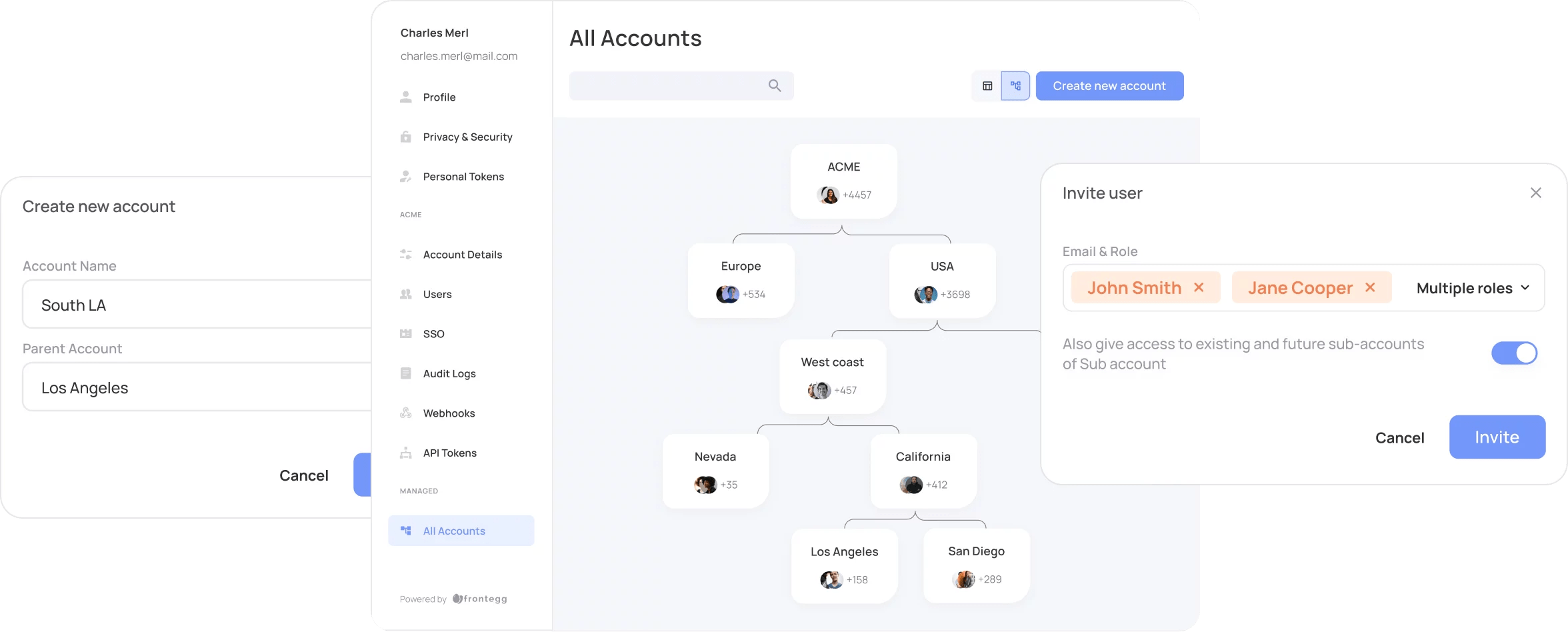Frontegg Forward is here to securely manage digital identities
Are you ready to bring more awareness to your brand? Consider becoming a sponsor for The AI Impact Tour. Learn more about the opportunities here.
Frontegg, the four-year-old startup focused on making secure user management software, today announced the launch of its all-new platform, Frontegg Forward, a no-code way for its enterprise customers to control their customers/end users’ digital identities and enable the proper permissions for those users when accessing online services and products.
Many of Frontegg’s customers are cybersecurity and software companies themselves, whose customers are found across industries, from healthcare to reinsurance.
End-users who work in these industries need access to specific apps and software tools to do their jobs, but keeping track of which employees should get which permissions and security clearances to access certain tools and information is a tricky endeavor, especially for companies focused on making software that does other things — such as run healthcare devices.
Since its founding in 2019, Frontegg has sought to streamline this end user identity management process for its enterprise customers, and now with Frontegg Forward, it plans to make doing so even easier — requiring literally no programming or developer knowledge to get set up and running.
VB Event
The AI Impact Tour
Connect with the enterprise AI community at VentureBeat’s AI Impact Tour coming to a city near you!
“We used to have three sets of ‘if’ statement predicates in our code, just to decide whether a user can access a certain API, one checking roles, another feature-flags and lastly validating that the user has paid for this feature,” said Ofir Assif, Director of Engineering at Frontegg customer Hunters Security, in a press release about Frontegg Forward. “With Frontegg we eliminate the need to use many APIs and vendors, and move the logic management to the product and revenue owners instead of the developers.”
“Frontegg Forward ushers in a new era of enabling developers to overcome this complexity,” added Sagi Rodin, CEO, Frontegg, in the release.
What Frontegg Forward offers
Frontegg Forward offers four main categories of features: user hierarchies, a security suite, entitlements, and signals, all of which can be used independently or concurrently depending on the needs of the specific customer and their end-users. In fact, flexibility and customizability are some of the key attributes Frontegg is hoping to offer.
We’ll briefly review each of the four feature categories now to give the reader a taste of what they can accomplish.
User-hierarchies keep users aligned with their teams’ proper permissions and data
These enable Frontegg customers to create “multi-layered tenancy trees,” essentially a way of organizing the end-users so that they can, as needed, be part of multiple teams and have access to the software apps, data, and services needed to fulfill their roles — but no more. This is also designed to occur automatically, when the end user signs up with the Frontegg customer’s software and creates an account with them, but the Frontegg customer developer can go in and of course edit the permissions as needed. Frontegg also provides a nice visual organizational tree showing different teams and the users nestled within them.

Security suite monitors and adapts to harmful behavior
Frontegg’s security suite is centered on a dashboard that provides IT administrators and cybersecurity officers with a quick, glanceable, yet highly detailed view of their software applications/network security status and all the noteworthy events that are taking place on it, such as the logs of bad actors like bots, and automatically applies additional security measures in realtime.
If Frontegg’s software suspects a bot or bad actor/hacker is trying to log in and create a new user account and identity on its customer’s platform, it will throw up additional points of friction and defenses such as mobile number verification to prevent them from moving forward.

It also automatically scans passwords and cross-references them with a database of those compromised in known breaches and automatically asks the user to generate a new one. The administrator can of course toggle this on or off. And it detects suspicious IP addresses, repeated log-in attempts indicating a brute force attempted intrusion, and physically impossible log-in attempts across disparate locations in a short time frame.
Entitlements controls access to specific features and data
This is a great tool for those enterprises who have sales teams making direct outreach to customers.
Now, with Frontegg Forward’s new Entitlements system, the sales team members themselves can flag the specific features their customers need and that their end-users need, and Frontegg’s Entitlements feature will automatically allow access to them or show the developer that said customers are requesting access, and that the request has come from a verified sales rep.
Using a single application programming interface (API) call, the Frontegg customer can get access to all the roles, permissions, teams, and information about what data and apps they can access.
Signals delivers insights automatically to Frontegg enteprise customers
It’s one thing to have awareness of the security events on your software platform or app and the state of the end-users and their permissions.
But Frontegg goes a step further, bringing forth additional analytics information for its customers about their end-users — such as user adoption of new features and potential new customers and upsell opportunities — all automatically and proactively, without the enterprise customer needing to ask.
Signals also delivers alerts about high churn rates and specific accounts at risk, as well as “champions” and “influential personas,” those users who are making the most use of an enterprise customer’s software and features.
The features are all available today through the Frontegg Forward platform, which starts at $99 per month for 10 multi-user accounts and jumps to $799 per month for 100 multi-user accounts, and variable pricing up from there depending on the userbase and needs.
VentureBeat’s mission is to be a digital town square for technical decision-makers to gain knowledge about transformative enterprise technology and transact. Discover our Briefings.


